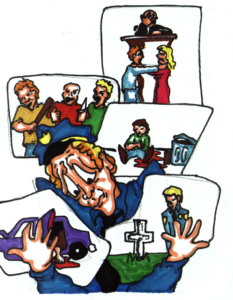Police Psychology: Emotional Extortion
by Gary S. Aumiller, Ph.D. ABPP
A baby cries in her bed. The parents run in and comfort her. She cries again, and they comfort her again. She never experiences crying alone because when she cries – she is comforted. The parents may even stay in her room or move her to their room to make sure she is comfortable and doesn’t cry. The parents do so to be good parents and it is sort of common. After a while, the parents say (or their doctor tells them) let her cry and she will learn she isn’t going to be comforted every time. The crying pains them, but they do it and eventually the child learns to fall asleep without crying. But, maybe the parents never let the child be alone and when she is a toddler she throws a tantrum, or when she is a pre-teen she throws an emotional fit and the parents come running to comfort her. They are locked into and controlled by their child by simply being a good parent. They are trying to keep their child calm and steady, making sure they don’t have too many negative emotions or maybe just trying to keep calm in their own life. This is one of many ways Emotional Extortion starts and it is painful when you are on the wrong side of it.
Now, given the Aumiller rule of “few things have a unitary cause,” this isn’t the only way for Emotional Extortion to start. Basically, when a person gets emotional and causes others to acquiesce, and it happens repeatedly, over and over again, that is Emotional Extortion. So, the parents who want to keep their kids calm or make it so they don’t get embarrassed by a tantrum is one way it happens, but it happens adult to adult as well. The guy who doesn’t want to hear his wife’s tirade for being home late or because he didn’t do something the way she wanted, that is Emotional Extortion. If he changes his behaviors, it is Emotional Extortion. The wife that tires to not upset her husband because he goes into an anger rage and thus she changes her behavior, that is emotional extortion. The key is that when you change your behavior to keep the other person’s emotions in check and it happens repeatedly – those are the factors that make it Emotional Extortion. (more…)
 Thin Blue Mind / Smokey Heroes
Thin Blue Mind / Smokey Heroes

 nights of drinking, camaraderie and debauchery. They would get drunk, be obnoxious to regular citizens and have sex with a variety of barmaids, hookers and naïve young girls wanting to have a good time. During the day, they would shoot gays in the park and bond together so nobody could get the real story and no cop could get charged. Their pranks on each other are so appalling and dangerous that Joseph Wambaugh actually had his name taken off the film. Superiors are all jerks, judges are listed as “black-robed pussies.” It was called a “film about brutes for brutes.” But the book and movie actually started something that is quoted frequently today, and perhaps is part of the way the public views cops.
nights of drinking, camaraderie and debauchery. They would get drunk, be obnoxious to regular citizens and have sex with a variety of barmaids, hookers and naïve young girls wanting to have a good time. During the day, they would shoot gays in the park and bond together so nobody could get the real story and no cop could get charged. Their pranks on each other are so appalling and dangerous that Joseph Wambaugh actually had his name taken off the film. Superiors are all jerks, judges are listed as “black-robed pussies.” It was called a “film about brutes for brutes.” But the book and movie actually started something that is quoted frequently today, and perhaps is part of the way the public views cops. spend 10 hours on a project you will be twice as far behind than if you only spend five hours on the project.” I think these were meant to be humorous, but I am not exactly laughing about them. In fact, it may have been true back then, but now it is more like work expands to fill any time in the day, including the time set aside for relaxation and comfort, and sometimes even dinner.
spend 10 hours on a project you will be twice as far behind than if you only spend five hours on the project.” I think these were meant to be humorous, but I am not exactly laughing about them. In fact, it may have been true back then, but now it is more like work expands to fill any time in the day, including the time set aside for relaxation and comfort, and sometimes even dinner.  campfire story. An urban legend at it’s best. Well they’re here, in Long Island New York, in Fishers Indiana, in New Orleans Louisiana, Albuquerque New Mexico and even in Hollywood California where the theatric meets the macabre. Why are they here? What do they want? Who are these BOZOS?
campfire story. An urban legend at it’s best. Well they’re here, in Long Island New York, in Fishers Indiana, in New Orleans Louisiana, Albuquerque New Mexico and even in Hollywood California where the theatric meets the macabre. Why are they here? What do they want? Who are these BOZOS?